商务英语综合教程杨翠萍主编第三册Unit_2
商务英语综合教程杨翠萍主编第三册
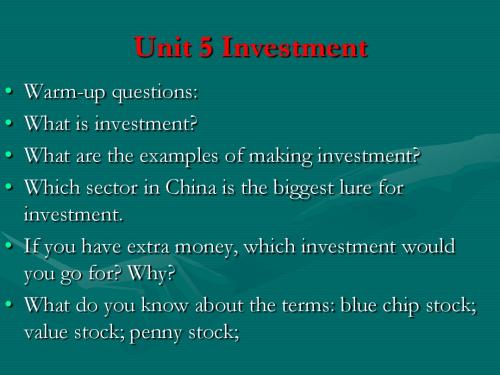
• • • • Warm-up questions: What is investment? What are the examples of making investment? Which sector in China is the biggest lure for investment. • If you have extra money, which investment would you go for? Why? • What do you know about the terms: blue chip stock; value stock; penny stock;
• Value Stocks • Stocks of this type generally sell at a low price from companies with a history of growth potential, as well as good earnings potential. However, prices for value stocks offered by these companies would not represent their value. Since many experts believe that value stocks offer only temporary benefits, seldom do people or even the stock markets use stocks of this type as an investment.
• Blue Chip Stocks(蓝筹股,热门股票) • Interestingly, these stocks were so named because of the color blue found in poke chips, which are the chips with the highest value in this game. Only specific companies would offer blue chip stocks, to include those with a long record of profit growth, as well as dividend payout(股息支付率). In addition, companies selling blue chip stocks would be those that have a longstanding reputation for the products and/or services it offers and high quality management of those products and/or services.
21世纪商务英语综合教程3册1—5单元复习资料
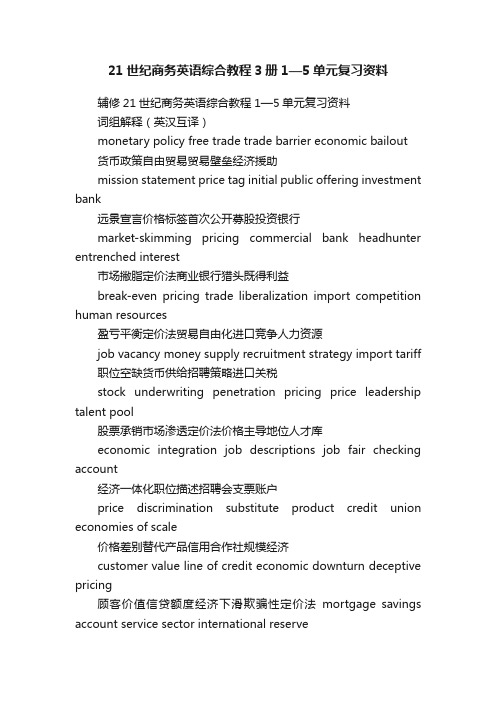
21世纪商务英语综合教程3册1—5单元复习资料辅修21世纪商务英语综合教程1—5单元复习资料词组解释(英汉互译)monetary policy free trade trade barrier economic bailout货币政策自由贸易贸易壁垒经济援助mission statement price tag initial public offering investment bank远景宣言价格标签首次公开募股投资银行market-skimming pricing commercial bank headhunter entrenched interest市场撇脂定价法商业银行猎头既得利益break-even pricing trade liberalization import competition human resources盈亏平衡定价法贸易自由化进口竞争人力资源job vacancy money supply recruitment strategy import tariff 职位空缺货币供给招聘策略进口关税stock underwriting penetration pricing price leadership talent pool股票承销市场渗透定价法价格主导地位人才库economic integration job descriptions job fair checking account经济一体化职位描述招聘会支票账户price discrimination substitute product credit union economies of scale价格差别替代产品信用合作社规模经济customer value line of credit economic downturn deceptive pricing顾客价值信贷额度经济下滑欺骗性定价法mortgage savings account service sector international reserve抵押贷款储蓄账户服务业国际储备charismatic leader customer value influence source regressive tax魅力型领袖顾客价值影响源递减税recruitment timeline price leadership招聘时限价格领先(地位)选词填空1.In recent years, the emphasis of business enterprises is on globalization. Firmsglobalize to achieve economies of scale and to widen their customer base.2.Through long and tough negotiations, they have in the end gained access to themajor trading ports of their business partners.3.With extra income from private sponsorship, the long-standing club is justmanaging to keep its head above water.4.More than 83 million people tuned in to a Haiti earthquake program Friday night,at which over $61 million was raised to help survivors in the country.5.Politicians should not engage in business affairs that might affect their politicaljudgment.6.People are more inclined to believe word of mouth promotion than more formalforms of promotion because the communicator is unlikely to have an ulterior motive.7.Section 63A prohibits a corporation from sending unsolicited credit cards.8.When an especially difficult interdepartmental problemarose, an ad hoc taskforce with a responsible head was created.9.I have his name right on the tip of my tongue. But I’ll have to think of it just for asecond.10.Our family was divided over my future. The argument came down to whether Ishould get a job to support the family or go on to college.11.New York Unemployment Website crashed under the weight of too manyclaimants in 2009.12.The publishers are helping comb through our latest book on the current financialcrisis, trying to make it as profitable as possible for them.13.At that time, torn jeans were all the rage.14.Sometimes customers aren’t willing to buy your product simply because you’veoverpriced it.15.The record sells like hotcakes.16.The company targets young girls as its prospective clients.17.Add it all together, and those of us who haven’t already opted to take control ofour digital-era lives will increasingly feel compelled to do so.18.You can pay either in cash or transfer via banks.19.He urged me to diversify and not keep all my money in one investment type.20.It was the tax deduction involved, rather than unselfishness, that prompted hisgenerosity to the charity drive.翻译(英译汉、汉译英)《21世纪大学商务英语综合教程》unit 1 Page 4unit 2 Page 30unit 4 Page 86unit 5 Page 110考试题型I.Please translate the following terms into Chinese. (20%)II.Match the terms in column A with the explanations in column B. (10%)III.Fill in the blanks with the proper forms of the words or phrases given. (10%)IV.Cloze. Please choose the right answer. (10%)V.Read the following article about the development of the knowledge economy and choose the right answer for the questions. (10%)VI.Fill in each of the following gaps with one of the sentences given below. (10%)VII.Translate the following Chinese passage into English. (15%)VIII.Translate the following English passage into Chinese. (15%)。
商务英语综合教程第3册第2单元参练习答案-推荐下载

Key to Unit TwoMyths and LegendsOverviewWarm-up ActivitiesIntensive ReadingExtensive ReadingReading & WritingWarm-up ActivitiesI.Starting upA.Decide from your common sense which of the following is a myth, a legend or a fable. Thencompare them with your partner’s.∙Kua Fu Chases the Sun. (myth)∙Yu the Great Conquers the Flood. (legend)∙Nü Gua Mends the Sky. (myth)∙The Town Mouse and the Country Mouse. (fable)∙Zeus, Prometheus and Pandora. (myth)∙Mark the Boat for a Dropped Sword. (fable)∙Venus, the Roman goddess of love. (myth)∙King Arthur and the Knights of the Round Table. (legend)∙The Wolf in Sheep’s Clothing. (fable)∙Robin Hood---Bold Outlaw of Barnsdale and Sherwood Forest. (legend)II. ListeningListen to the following three passages and then do the relevant exercises.A.Listen to Passage 1 and answer the questions.1.Their names are Plan Ahead, Think Fast, and Wait and See.2.Towards the same issue, the three fish made different responses: Plan Ahead said, “I'mswimming down the river tonight!” Think Fast said, “I'm sure I'll come up with a plan.” Wait and See lazily said, “I just can't think about it now!”3.When the fisherman cast his nets, Plan Ahead was long gone. But Think Fast and Wait andSee were caught! Think Fast quickly rolled his belly up and pretended to be dead and so the fisherman threw him safely back into the water. But, Wait and See ended up in the fish market.B.Listen to Passage 2 describing the myth and legend which surround St George’s Day andcomplete the sentences below.1.slayer, saviour, medieval texts and art, little information about2.valorous deeds, 12th century, rescuing a king's daughter, slaying a dragon3.popularized, knights, Middle East4.have appeared, white robes, siege, patron saint, Henry V's victory5.stake a claim, invoke, exorcise demons, associated with fertilityC.Listen to Passage 3. In this part, you will hear a lecture given by a historian. He will talkabout the 1906 San Francisco earthquake myths which persist even after 100 years. After you have heard the lecture, select the best answer from the four given choices.1.B2.C3.D4.D5.C6.D7.A8.DIII. DiscussionB.Work in groups of three or four and discuss the following questions:1.Yes, it is. In the absence of scientific information of any kind, long ago societies all over theworld devised creation myths, resurrection myths, and complex systems of supernatural beings, each with specific powers, and stories about their actions. Since people were often isolated from each other, most myths evolved independently, but the various myths are surprisingly similar, in particular creation myths.2.The first function of myth is the need: myth is a universal need. Over time, one version of amyth would become the accepted standard that was passed down to succeeding generations, first through story-telling, and then, much later, set down in written form. Inevitably myths became part of systems of religion, and were integrated into rituals and ceremonies, which included music, dancing and magic.The second function of myth is to justify an existing social system and to account for its rites and customs. One constant rule of mythology is whatever happens among the gods reflects events on earth. In this way, events such as invasions and radical social changes became incorporated into myths. Some myths, especially those from the Greco-Roman and medieval periods, also serve to illustrate moral principles, frequently through feats of heroism performed by mortals.ExercisesI.Reading Comprehension1.Yes, they are. Myths are significant stories for their culture, and their significance sometimesresonates over millennia and far beyond their original culture. Myths permeate every culture, and are borrowed, retold, and live again in fresh imaginings. They are the stories of cultural beginnings, of how people's lives and ways of thinking came to be shaped, and they still help to shape the way that many people understand themselves and the world.2.Explanatory myths pose and offer the answers to questions that puzzle the philosophers. Suchquestions cannot be answered from a purely rational framework, and the greatest philosophers have sometimes resorted to the language of myth to treat such issues. On theother hand, etiological myths explain the range of phenomena in the world by offering answers that science casts aside, as science has its own rational explanations for celestial visitors like comets and eclipses, phenomena of the weather, geological formations, and the like, but these myths still offer a truth of the imagination, if not the scientific truth that can be weighed and calculated and predicted.3.Because m yths give the p eoples of the world reasons f or ritual, and enforce certain s ocialbehaviors with promises of divine favor and real t hreats of divine punishment.Especially in tribal cultures,myths are potent means of s ocializing children into the w ays of the people.Myths l ay down the many important rules, for instance, for t he right behavior towarda nimals that are hunted, or s et up the precedent for a people's system of law.4.This is due to the cultural differences. In times before literacy was widespread, in the daysbefore the printing press, myths were told and retold countless times. Some cultures valued the precise words of their myths as sacred texts given to them by the gods, and they sought to transmit their myths in exactly the same way. Other cultures enjoyed varying the elements of the story, so that each time the myth was retold, it would be slightly different, with its listeners enjoying the variations as part of the pleasure of hearing this particular version of the traditional tale.5.Besides using words as a medium to pass on m yths from generation to generation, peoplealso use sacred artworks or carvings on rocks, special dances or music, and ritual enactment to spread myths.6.Perhaps it is because all peoples have a thirst for insights into the mysteries of life, from theorigin of consciousness to the end of the world. And myths tend to have an enduring power because they do not limit the world to statistically verifiable facts and figures, because they people the familiar world with wonder and marvel, and because they intersect humanity with the world of the animals and that of the gods. All myths stretch our ways of perceiving the world, and have the power to lift us away from our mental habits.7.He says that we need the stories of myth to make sense of the confusion of our society andour own psyches. Myths voice the truths of our unconscious selves, and the gods, goddesses, and heroes of myth embody aspects of creativity, cleverness, grief, joy, aggression, and ecstasy.The monsters of myth are really monsters of the mind; the tragedies and triumphs of myth reflect upon the ways in which we seem to be tossed to and fro psychologically by forces that are beyond our control. Human beings are myth-makers by nature, always curious, always psychologically living out the patterns of myth or being lived out by them.8.Because the printing press came into popular use, and it has helped to fix one form of astory as the correct version. Besides, radio, film, television, and video have also helped to fix more stories, which in turn discouraged the art of telling and retelling traditional stories over and over again.9.The Internet. Myth may once again flourish in chat rooms and e-mail transmissions, ona scale far beyond that of the ancients.10.Because in our life some popular figures are loved by people and sometimes they are eventreated as people’s idols all over the world. When they died, people will use different ways to commemorate them and gradually the stories told about them will have different variations and become more or less myths.II.Paraphrase1.For their own cultures, myths are important stories which are liked, enjoyed by the peopleand they have lasted for thousands of years, and what is more, they even spread through all the other foreign cultures, and gain new versions, interpretations and variations while being told. (Para. 2)2.Some myths explain the hard questions and describe the difficult phenomena which thephilosophers want to understand.(Para. 3)3.Many myths focusing on the causes and reasons of the natural phenomena have their ownunderstandings and interpretations towards these things. But science does not think they are right because it has its own reasonable explanations for the space issues, for instance, the comets, the eclipses, the change of the weather, the geological formations and so on. But in these myths there is a certain truth although the truth cannot be regarded as the scientific one, as the latter can be measured and seen in advance. (Para. 4)4.Myths give the people of all nationalities in the world the reasons for religious ceremonies,emphasize and strengthen the social manners. If they follow the practice, they can get the praise and honour from a god or God, otherwise, they will be likely punished by them. (Para.5)5.Most myth writers are unknown because they were told long before the writing came intobeing, and only few of the first story tellers could be known. (Para. 6)6.Myths are told in different forms. We can find them in the religious paintings, rock carvings,unique dances or music, and religious performance. (Para. 7)7.Certainly some myths give praise and thanks to a state or city, give religious punishment toinvasion and political control over other countries, but this is not the reason why these myths could last much longer than the state or the empire themselves for several thousand years.The reason is that in the myths there is something which is strong and super enough which makes the myths go far beyond the reason itself and the different cultures. (Para. 8)8.Myths are likely to last longer because they do not restrict themselves to the confirmed factsand numbers, because they give wonders and surprises to people in their normal life, and because they join the world of animals and the world of gods with the world of human beings.(Para. 9)9.By nature human beings love to create myths because they want to know about things, and inheart they want to experience the life style in myths or they wish the life style of myths could be part of their experience. (Para. 11)10.The sudden, large increase of great sadness people felt over the death of Princess Diana is thesame as people all over the world felt over the much earlier and unexpected death of the Norse god Baldr. (Para. 13)III. Word Practice1.strenuous2.afresh3.variation4.permeated5.embody6.transcend7.glorify8.precedentmemorate 13.console14.outlast15.ecstasyExtended ActivitiesII.Word Practice1.calculated2.transmitted3.decoration4.to enforce5.insights6.posed7.claimed8.distorted9.determined10.stumbled11.predicted12.advent13.celebrates14.Perceiving15.fascinatingIII.Cloze1.head2.invaders3.persuaded4.battle5.stake6.glimpse7.period8.chaos9.surrounding10.grasp11.fascinated12.victory13.conclude14.symbol15.bombardingIV. Translation1.The lives of many different scientists have shaped the way that people view the world.2.Chinese scientists have traced the severe acute respiratory syndrome (SARS) virus back to asimilar virus found in the civet cat, an animal found in the wild in China.3.If the fantasy originates at the moment of loss, then it must gesture toward a mythic origin.4.Located in the heart of Kabul, Flower Street is different at Christmas from any other time ofthe year, transformed into a festival place.5.You may have failed the examination, but you can at least console yourself with the thoughtthat you did your best.Extensive ReadingChinese Creation MythologyExercisesI.Speed Reading Comprehension1.B2.C3.C4.A5.DIII.Word Practice1.merging2. trailing3.weird4. purports5.cardinal6.transformed7. whirl8.wander9. propriety 10.trodden Reading & WritingJupiter’s Love Towards EuropaExercisesI. Reading Comprehension1.C2.C3.A4.B5.D。
商务英语综合教程第三册课件 Unit 2 International Marketing

商务英语综合教程 (第三册)
Unit 2 International Marketing (1)
Warm-up Activities Notes of Text Text Analysis Exercises Writing
Company Logo
Unit 2 International Marketing (5)
• 7. kiosks:该词源于土耳其语,原意为路边无人 看管的书报摊,现引申为一种自助的概念:自助服 务机,信息服务亭。提供产品或储存信息及提供媒 体展示的自助式服务设备(self-service devices)。具体来看,这种自助式服务设备整合 了各式软硬件设备,以影片、图片、文字、音乐等 多媒体数据库形成的互动环境,提供各类产品贩售 或是信息服务。
Company Logo
Unit 2 International Marketing (2)
Warm-up Activities
1. Pair work
Explain how companies identify attractive market segments and choose a target marketing strategy.
Company Logo
Unit 2 International Marketing (7)
(1) Are you ready to participate in the mad shopping frenzy that we partake in every year, not only on Black Friday but all holiday season long?
综合商务英语教程第三册unit 2Corporate Culture

III. Reading
• Read the article again and answer the following
questions.
• • 1. According to the author, to achieve results like
different companies
I. Lead-in
• Work in pairs. Discuss the differences and
similarities of corporate culture in Chinese and American companies according to their national cultures. Bring forward at least three differences and three similarities.
• 4. turnover • 5. performance • 6. practice
• d. how well or badly a person, company
etc does a particular job or activity
• e. the knowledge and imagination that
• A 2003 Harvard Business School study reported that
has a significant impact on an organization’s long-term economic . The study examined the management at 160 organizations over ten years and found that culture can enhance performance or prove bad to performance. with strong performance-oriented cultures witnessed far better financial growth. Additionally, a 2002 Corporate Leadership Council study found that cultural traits such as risk taking, internal communications, and flexibility are some of the most important drivers of performance, and may on individual performance. Furthermore, innovativeness, through people, and the other cultural factors also have positive economic consequences.
三版综合英语第三册2单元教参
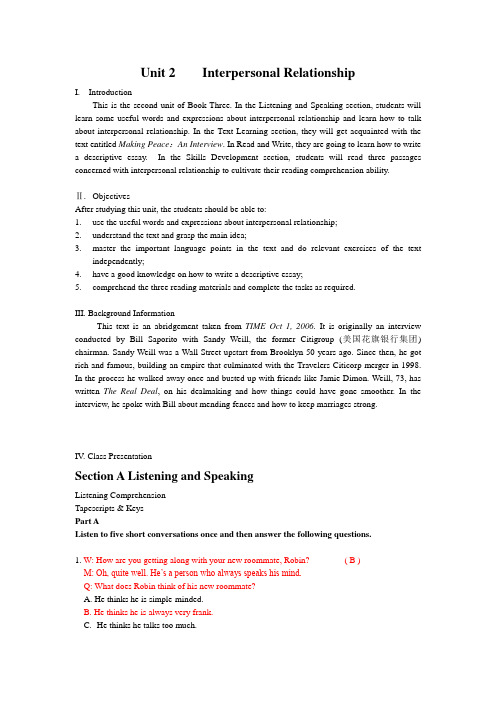
Unit 2 Interpersonal RelationshipI. IntroductionThis is the second unit of Book Three. In the Listening and Speaking section, students will learn some useful words and expressions about interpersonal relationship and learn how to talk about interpersonal relationship. In the Text Learning section, they will get acquainted with the text entitled Making Peace:An Interview. In Read and Write, they are going to learn how to write a descriptive essay. In the Skills Development section, students will read three passages concerned with interpersonal relationship to cultivate their reading comprehension ability.Ⅱ. ObjectivesAfter studying this unit, the students should be able to:1. use the useful words and expressions about interpersonal relationship;2. understand the text and grasp the main idea;3. master the important language points in the text and do relevant exercises of the textindependently;4. have a good knowledge on how to write a descriptive essay;5. comprehend the three reading materials and complete the tasks as required.III. Background InformationThis text is an abridgement taken from TIME Oct 1, 2006. It is originally an interview conducted by Bill Saporito with Sandy Weill, the former Citigroup (美国花旗银行集团) chairman. Sandy Weill was a Wall Street upstart from Brooklyn 50 years ago. Since then, he got rich and famous, building an empire that culminated with the Travelers-Citicorp merger in 1998. In the process he walked away once and busted up with friends like Jamie Dimon. Weill, 73, has written The Real Deal, on his dealmaking and how things could have gone smoother. In the interview, he spoke with Bill about mending fences and how to keep marriages strong.IV. Class PresentationSection A Listening and SpeakingListening ComprehensionTapescripts & KeysPart AListen to five short conversations once and then answer the following questions.1. W: How are you getting along with your new roommate, Robin? ( B )M: Oh, quite well. He’s a person who always speaks his mind.Q: What does Robin think of his new roommate?A. He thinks he is simple-minded.B. He thinks he is always very frank.C. He thinks he talks too much.D. He thinks he is absent-minded.2. W: Hello, I’m Jessica. But have we met before?( A )M: No, I’m new here. I’ve just started working with this company.Q: What can we learn about the man from the conversation?A. He’s a new employee.B. He’s a visitor.C. He’s the boss.D. He’s the woman’s friend.3.W: Jeff, What do you think of your first day in the office? ( C )M: Everyone helped me and I felt great.Q: How did the man feel about his first day in the office?A.He was tired.B. He was sick.C. H e was happy.D. He didn’t like the office.4. W: Will you come to the party with us this evening, Kevin? ( D )M: If only I’d finished my book report, I’d be joining you with pleasure.Q: What is Kevin going to do?A. Join his friends.B. Go to the library.C. Go to the bookstore.D. Write a report.5. W: Tony is very nice, but his sister is much too talkative. ( B )M: I know, and she isn’t especially friendly either.Q: What do they think of Tony’s sister?A. She doesn’t talk very much.B. She isn’t a pleasant person.C. She is a very friendly person.D. She is a special friend.Part BListen to three long conversations once and then choose the correct answer. Conversation 1M: Hi, Jenny. Y ou are not happy, are you?W: No, I’m feeling very bad.M: What makes you unhappy?W: My parents.M: Why? I guess they must love you very much. What’s the matter?W: I know they love me. But they always want me to do what they wish regardless of my feeling. M: Oh, I see. There is a generation gap between your parents and you.W: Generation gap? What’s it?M: It refers to a lack of understanding between parents and child.W: That’s true. I don’t think they understand me.M: But have you ever tried to communicate with them your ideas?W: Maybe not much.M: In my opinion, you should communicate with your parents as much as you can.Q6: Why does Jenny feel unhappy? ( C )A. Because her parents love her too much.B. Because her parents don’t love her much.C. Because her parents want her to do what they wish regardless of her feeling.D. Because her parents never respect what she wants to do and what she feels.Q7: According to the conversation, what is a generation gap? ( A )A. A lack of understanding between parents and child.B. A lack of misunderstanding between parents and child.C. A lack of communication between parents and child.D. A lack of patience and trust between parents and child.Q8: What does the man suggest for Jenny to do? ( B )A. Love her parents as usual.B. Communicate with her parents as much as she can.C. Neglect what her parents want her to do.D. Do what she wants to regardless of her parents’ feeling.Conversation 2M: Do you think young people are given too much freedom nowadays, and as a result they’ve lost respect for their parents and elders generally?W: I don’t think so. My parents never interfered with my plans too much. I think I respect and love them more for this.M: Are you quite independent of them now?W: Y es. Since I left school, I’ve become independent financially. But I still stay with them a lot, as you know.M: Y ou seem very close to your parents.W: I’m lucky because I get on very well with my parents. I know that many young people today say they have nothing in common with their parents. How about you?M: Well. I’m very fond of my family, but I don’t always get on well with my parents. They try to control me too much.W: That’s really a problem.M: Maybe it’s just because of a lack of communication.Q9: What does the man think of the young people nowadays? ( B )A. They are controlled too much by their parents.B. They have much freedom and have less respect for their parents.C. They always do what they want to do, regardless of their parents’ opinions.D. They are always getting on very well with their parents.Q10: According to the woman, which one is NOT true about her relationship with her parents?( D )A. She gets on very well with her parents.B. She respects and loves her parents.C. She is very close to her parents.D. Her parents interferes with her plans too much.Q11: Why does the woman think she is lucky? ( C )A. She’s become independent financially.B. She has a lot in common with her parents.C. She gets on very well with her parents.D. She still stays with her parents.Q12: What is the reason why the man doesn’t get on well with his parents? ( A )A. Because of a lack of communication.B. Because of a lack of financial independence.C. Her parents try to control him too much.D. He has nothing in common with his parents.Conversation 3M: Hi, Lily! How are you?W: Hi! Fine, Oliver. How are you? Long time no see.M: I’m not too bad—still struggling to learn some Chinese. But that’s why I have such a good friend like you, because you can help me…W: Y eah, I suppose. But do you know that I feel the same about my English classes? I feel frustrated by the lessons.M: The thing is to understand that a new language takes practice and patience.W: Yeah, I know that. But how can I help myself further and be more positive?M: Well, I would suggest talking about your favorite activities.W: Well, that does sound simple. But I get embarrassed when I talk.M: That’s expected. Another thing you can do is try reading English books and newspapers.W: Thank you. Y ou’re such a good help.Q13: What is Oliver struggling to learn? ( A )A. ChineseB. EnglishC. JapaneseD. FrenchQ14: What frustrate Lily in her studies? ( B )A. Her English teachers.B. Her English lessons.C. Her Chinese classes.D. Her English books and newspapers.Q15: How does Lily feel when she tries to speak English? ( D )A. Positive.B. Confident.C. Frustrated.D. Embarrassed.Part CListen to a recorded passage three times and fill in the blanks numbered from 16 to 23 with the exact words you have just heard. For blanks numbered from 24 to 25 you are required to fill in the missing information. For these blanks, you can either use the exact words you have just heard or write down the main points in your own words.Do you remember a time when people were a little nicer and gentler with each other? I certainly do and I feel the much of the 16 world has somehow gotten away from that. Too often I see people rushing into elevators without giving those inside a 17 chance to get off first or never saying “thank you” when others hold door open for them. We get lazy and in our 18 laziness, we think that something like simple “thank you” doesn’t really matter, but it can 19 matter very much. The fact is that no matter how nicely we dress or how beautifully we 20 decorate our homes, we can’t be truly 21 elegant without good manners because elegance and good manners always go hand inhand. In fact I think of good manners as sort of hidden 22 beauty secret. Haven’t you noticed that the kindest, most 23 generous people seem to keep getting prettier. It’s funny how that happens, but it does. 24 Take the long-lost art of saying “thank you”, like wearing a little make-up or making sure your hair is neat. 25 Getting into the habit of saying “thank you”can make you feel better about yourself. Good manners add to your image while angry face makes the best dressed person look ugly.Section B Text LearningRead and ThinkThink about the following three questions and answer them after reading the text.1. What was Sandy Weill’s way of firing people?Although he was not very good at firing people, he let those people be in the company way too long, until the problem became bigger. Then he asked somebody else to do the actual firing or letting them go.2. How did Sandy Weill think of his wife, Joan?She was his personal president, his adviser and his confidant. She never interfered in his business and had very good judgment about people. She was invaluable in many ways.3. In what way did it benefit the Citigroup to be inclusive of spouses of employees in the group? The group would end up having two supporters in that household.Read and PracticePractice 1: Comprehension Check1. After he had spent two years on a book, Sandy Weill felt _____________________.A. it was time to renew friendship with the persons he worked with in Citigroup.2. Which of the following statements about Sandy Weill is not true?B. He had a good relationship with Jamie and told him a way to success.3. Which one of the following is not his strength according to Sandy Weill?D. Come face to face with people.4. Why was his wife Joan invaluable to Sandy Weill?C. She had very good judgment about people and feelings and about him.5. What was the reason that Sandy Weill had always been inclusive of spouses of employees inthe group?A. The group would have two supporters in that family.Practice 2: Retell the text by filling in the blanks with the right words chosen from the word list given below.In an interview, Sandy Weill talked about writing a new book and 1 mending fences. He expressed the idea of 2 renewing friendship with Jamie Dimon and John Reed, with whom he once worked in Citigroup.He thought he was not quite up to 3 firing employees. When the actual firing had to be done, he just asked somebody else to do it. This was because he was, in his opinion, loyal to people, so when someone started doing a wrong thing, he would let the person do it until the problem becamebigger. This was his way of dealing with dismissing some unwanted employees. However, there was an exception. He actually did fire Jamie Dimon because he had enough of a 4 relationship with Jamie. But he thought that was not easy.He told the reporter that his strength was to 5 evaluate business and get the business grow. He encouraged all the people in the company to make the decisions about who should stay and who should leave. He’d always relied on his wife Joan for 6 consultation . He considered his wife as his good adviser and confidant who would never 7 interfered in business. Sometimes, he relied on her to make good judgment, because she understood his 8 strengths and his weaknesses.In his company, he’d always been 9 inclusive of spouses of employees, which he thought was beneficial to the company. In his opinion, the company would have two 10 supporters in that household.Practice 3: Choose the best answer.1. He is my A. collaborator on a biography of Lu Xun.2. He made some _ C. knowledgeable remarks at the meeting.3. The two businesses eventually contracted a __ B. merger after two years of negotiation.4. The two firms have decided to D. renew _ their business relations.5. They _ A. confronted the vital question of being bankrupt.6. It is difficult or impossible to _ B. evaluate _with precision the sales plan.7. It was B. sensible of you to refuse the proposal.8. The college authorities held a(n) _ A. consultation _to decide whether a project was necessary.9. His wife is an _ C. outgoing woman; she is on good terms with her neighbors.10. He has many secrets that only a close _ D. confidant _ like Tony could know.11. I hope my father will never B. interfere in my business affairs.12. The conference is to last from Wednesday to Friday _ A. inclusive .13. She acted C. intelligently in this difficult and embarrassed situation.14. The two friends often quarrel over the business C. issues of their company.15. It B. turned out that he didn’t get the job he had dreamed of.16. George was working A. on that article at that time.17. It's not easy for a girl to B. part with her beloved parents.18. The success of this project is C. up to us.19. Economic development should D. rely on both domestic and foreign markets.20. He prefers to do A. rather than talk.Language Points1. Is this new book a chance to even the score?a chance to do做……的机遇/机会e.g. a chance to escape 逃跑的机会a chance to win 有赢的机会even the score结清宿怨;拉平比分even n. 冤情; 宿怨e.g. settle an old score 平反一场旧的冤情Tony and Alex wanted to even the score through a gathering.托尼和阿莱克斯想通过一场聚会来结束宿怨。
商务英语III-2
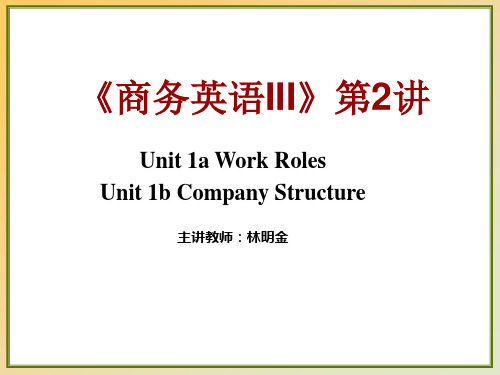
Introduction The purpose of this report is to assess the suitability of the position as Resource Planning Manager for home-based working.
Findings
The working pattern and that of colleagues in Resource Planning Department varies from week to week. During certain periods a large proportion of time is spent doing fieldwork. This is followed by office-based work collating and recording the data collected. Once the results have been recorded, I proofread the colour copies of all reports and maps.
* Introduction
The report/proposal aims/set out to…. The aim / purpose of this report/proposal is to… The report is based on….
* Findings
It was found that… The disparity clearly showed … The following points summarise our key findings. The key findings are outlined below.
商务英语综合教程杨翠萍主编第三册-Unit_1

• Most of us have been to seminars or conferences where we've left feeling inspired and rejuvenated. But how many of us have ever left everyday meetings feeling the same w Rarely, no doubt. The reason is that good seminars and conferences are organized precisely to engage us. Sadly, most office meetings are not. • Believe it or not, meetings can and should be the most interesting and productive part of your day. And if you've ever been to a great conference or seminar, you already have seen some of the basic principles at work. These can be summarized as: 1) preparation 2) facilitation 3) inspiration 4) results
Reading II
Para. 1 Questions: 1. What is the main idea of Pra. 1? 2. What is the problem of the business pointed out? 3. How to solve the problem?
商务英语综合教程杨翠萍主编第三册Unit_3
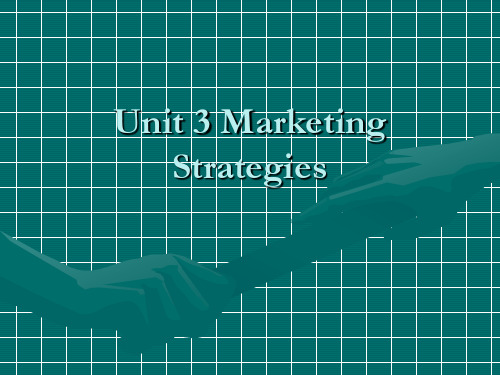
• 1. 2. 3. 4. 5.
WarmWarm-up questions: What is market? What is marketing? What is a marketing strategy? What marketing strategies can you think of? What are the differences between marketing and advertising? 6. What programs will you run as a marketing manager to implement the following strategies? (1) Increase number of users (2) increase rate of purchase (3) maintain customer satisfaction (4) simplify buyer’s purchasing process (5) reduce buyer’ chances of losing customer to competitors
• • • • • • 1. 2. 3. 4. 5.
What is market? (Read the following sentences and explain the meaning of the word market in each context) Farmers going to market look so happy you never believe they just went through a grave flood. There is a market for ornamental daggers. The American market remain in recession. The future development cannot simply be left to the market. market. Sheep farmers are still unable to market their laபைடு நூலகம்bs. offer for sale the free market; the operation of supply and demand the state of trade at a particular time or in a particular context a demand for a particular commodity or service an area or arena in which commercial dealings are conducted
综合商务英语第三册Unit 2讲稿

Stห้องสมุดไป่ตู้pSix: Homework
Preview the following paragraphs
讲稿
讲授内容
备 注
Unit 2
Home! Sweet Home!
By the end of the Unit, the Ss should be able to: 1. To understand the main idea of the 3 texts and establish the link among them; 2. To understand different cultures they may encounter the travel; 3. To talk about their own travel experience; 4. To research on the key terms related to the Unit; 5. To realize the importance of ecotourism; 6. To have a basic understanding about European vacation culture; 7. To understand and use the expressions picked from the texts教学重点1. Structural analysis of the text 2. Expressing opinions, making comparisons教学难点1. Structural analysis of the text 2. Rhetorical features of the text 3. Some notions: travel literature, travel experience, ecotourism, sustainability, vacation culture教学方法Reading: reading for general ideas, specific information, implied meaning Listening: listening for the gist and listening for specific information, listening and note-taking Speaking: discussion, survey, presentation skills Writing: using a comparison matrix as an outline Business-oriented skills: case study, research Study skills: word formation
综合商务英语(3)unit2
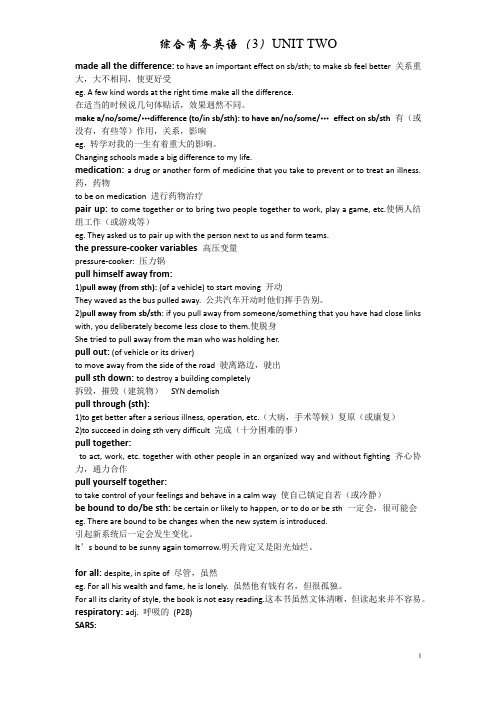
made all the difference: to have an important effect on sb/sth; to make sb feel better 关系重大,大不相同,使更好受eg. A few kind words at the right time make all the difference.在适当的时候说几句体贴话,效果迥然不同。
make a/no/some/…difference (to/in sb/sth): to have an/no/some/…effect on sb/sth有(或没有,有些等)作用,关系,影响eg. 转学对我的一生有着重大的影响。
Changing schools made a big difference to my life.medication: a drug or another form of medicine that you take to prevent or to treat an illness. 药,药物to be on medication 进行药物治疗pair up: to come together or to bring two people together to work, play a game, etc.使俩人结组工作(或游戏等)eg. They asked us to pair up with the person next to us and form teams.the pressure-cooker variables 高压变量pressure-cooker: 压力锅pull himself away from:1)pull away (from sth): (of a vehicle) to start moving 开动They waved as the bus pulled away. 公共汽车开动时他们挥手告别。
全新版大学英语综合教程第三册Unit2官方版课件

Practical expression explanation
Practical expressions
"I'd like to", "I'm going to", "I've got to"
Explanation
These expressions are used in different contexts to express one's intentions, plans, or obligations. Understanding their usage can help learners express themselves more naturally and accurately in English.
Achievements
John Smith has won numerous awards for his outstanding contributions to the field of English language education, including the "Outstanding Educator Award" and the "Lifetime Achievement Award".
Introduction of the text author
Name
John Smith
Background
John Smith is a well-known English writer and educator, who has published numerous books and articles on English language teaching and learning.
综合教程Unit 2 The Company Man-- Words and expressions

Unit 2 The Company Man--words and expressions
4 acquaint: v. ~ sb/yourself with sth (formal) 使熟悉;使了解 to make sb/yourself familiar with or aware of sth Please acquaint me with the facts of the case. 请把这事的实情告诉我。 Derivations: acquainted: adj. [not before noun] 1 ~ with sth (formal) 熟悉;了解familiar with sth, having read, seen or experienced it Employees should be fully acquainted with emergency procedures. 雇员应当十分熟悉应急措施。 2 ~ (with sb) (与某人)相识,熟悉not close friends with sb, but having met a few times before I am well acquainted with her family. 我和她家里的人很熟。 acquaintance: n. [C] 认识的人;泛泛之交;熟人a person that you know but who is not a close friend Claire has a wide circle of friends and acquaintances . 克莱尔交游很广。 have a nodding acquaintance with sb/sth 与…有点头之交;对…略知一二 to only know sb/sth slightly
商务英语综合教程杨翠萍主编第三册-Unit_4
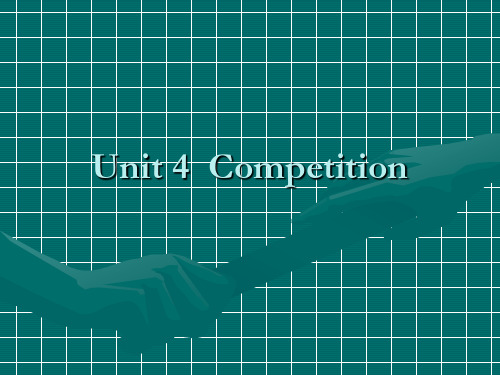
3. What is cooperative competition?
Co-operative competition is based upon Copromoting mutual survival - “everyone wins” wins”. Adam Smith’s “invisible hand” is Smith’ hand” the result of a process where individuals compete to improve their level of happiness but compete in a cooperative manner through peaceful exchange and without violating other people. Cooperative competition focuses individuals/groups/organisms individuals/groups/organisms against the environment.
• 1. What is compen is a contest between individuals, groups, nations, animals, etc. for territory, a niche, or a location of resources. It arises whenever two or more parties strive for a goal which cannot be shared. Competition occurs naturally between living organisms which co-exist in the cosame environment. For example, animals compete over environment. water supplies, food, and mates, etc. Humans compete for water, food, and mates, though when these needs are met deep rivalries often arise over the pursuit of wealth, prestige, wealth, fame. and fame. Business is often associated with competition as most companies are in competition with at least one other firm over the same group of customers.
新视野商务英语综合教程3_U2电子教案
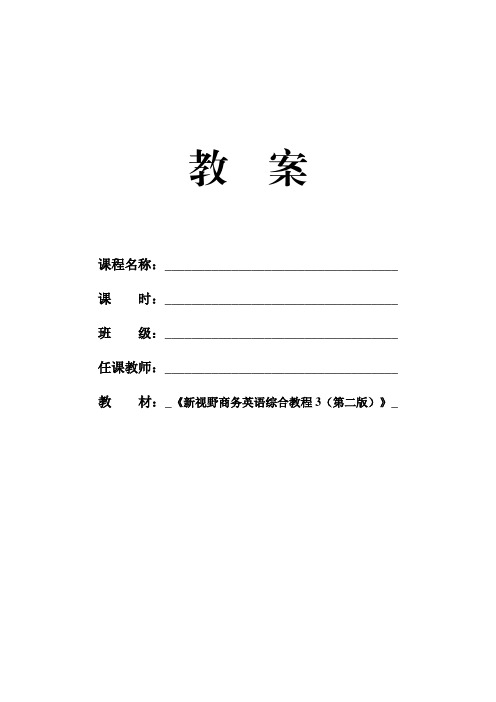
教案课程名称:___________________________________ 课时:___________________________________ 班级:___________________________________ 任课教师:___________________________________ 教材:_《新视野商务英语综合教程3(第二版)》_Unit 2 NegotiationsUnit Overview (单元概览)By studying this unit, you are expected to:●learn some personal and team negotiation styles;●know how to deal with negotiators from different cultural background;●make good use of home/guest court advantages in negotiations.Lead-in (主题导入)●Ask the students to recall their personal experiences when negotiating with othersand think of some inappropriate actions in negotiations.●Ask the students to work in pairs and tick the inappropriate items and give thereasons.●Select some representatives to present their opinions.Task 1●Ask the students to think of some strategies or styles in pairs.●Ask the students to propose some countermeasures to correspond with theircounterparts’ strategies or styles.●Ask the students to read Reading A and summarize the strategies or stylesmentioned in the text.Task 3●Ask the students to find information in the text which supports or goes againsteach statement in the task.●Ask the students to correct the incorrect statements with their own words. Activity 1●Divide the whole class into 2 groups, and then each group into 4 — 5smaller groups.●Ask each bigger group to surf the Internet or check some references aboutpersonal or team negotiation styles.●Then ask each smaller group to focus on one style only and look forinformation about its characteristics and examples.●Ask the representative of each group to present their findings to the class.Task 1●Ask the students to brainstorm some examples of misunderstanding caused bycultural differences.●Ask the students to brainstorm some Dos and Don’ts in communicating withpeople from different cultural background.Activity 2●The United States:The United States is the largest economy in the world. The U.S. has thehardest currency in the world and, like it or not, almost all of countriesmeasure themselves against an “American” yardstick.True to history, Americans believe in winning wars by accepting a few lostbattles. U.S. negotiators are extremely nimble and can change strategy andtactics during a ten-minute break. Yo u’d better be able to respond in kind.They are the practitioners of the original cowboy mentality, and anAmerican company will usually send its negotiators into the field with anunusual amount of authority. They often assume that counterparts havesimilar authority. Individualistic by nature, they can also be good teamplayers.●The United Kingdom:The U.K. has been a top player in international trade and it is certainly itsfirst global practitioner. That's the reason for its standoffish approach to theEuropean Union and its single-currency policy.Being old hands at international business, plus that their history ofnegotiation goes back centuries, the depth of their knowledge is without comparison. So, you’d better arrive in the U.K. thoroughly prepa red and equipped with numerous options. Don’t attempt to learn how things work “at the table”, or your British counterpart will “hand you your head”. Presentations should be detailed, with a minimum of hyperbole. The British have seen everything “under the sun” and there’s nothing new there, so get to your point. The class system is still very much alive and proper connections will make a difference for long-term projects. Government agencies and industrial associations are good starting points for small-and medium-size deals.Listening (听力练习)Task 1●Ask the students to brainstorm their previous experiences of purchasing certainproducts, and to think of what techniques they adopted to negotiate about theprices.●Ask the students to listen to the recording once and try to decide whether thestatements are true or false.●In the second listening, ask the students to correct the false statements, as well asto pay more attention to the figures.●Check the answers with the whole class.●In the third listening, ask the students to imitate the bargaining process, includingexchanging offers, giving counter offers before reaching an agreement.●Ask students to do the oral exercise in pairs. Make sure they display their cardson the negotiation table one by one to propel their negotiation.Task 2●Write down the phrase “payment grace period” on the board and ask the studentsto guess its meaning.●Ask the students to read the five statements first and mark out some phrases orexpressions that they find difficult to understand.●Spare them some time to check those phrases or expressions in a dictionarybefore the listening.●Play the recording twice for the students to get enough information to tick thechoices. Then check the answers and explain those phrases and expressions for them.Task 3●Ask the students to read the setting as well as the short passage before listeningand anticipate the answers to some blanks.●Play the recording twice for the students to get information to complete thepassage.●Check the answers and then ask them to discuss the questions that followed. Askthem to distinguish between daily small talks and small talks in businessenvironment.●Ask the students to brainstorm some unpleasant experiences when exchangingsmall talks, either in daily contexts or in business ones.Communication Project (商务沟通)Task 3●If time permits, ask the students to role-play some scenes concerning about eachparty carrying out their court advantages upon their counterpart.●Have a class vote for the best performance.Activity 3●Divide the students into smaller groups.●Ask the students to prepare a PPT display, and if possible, to extract somevideo clips, or to embed into their presentation some role-plays to make itvivid and impressive.Writing (商务写作)Task 1●Ask the students to brainstorm in pairs about some Dos and Don’ts concerningthe negotiations with the Germans; ask them to list them out on a piece of paper without referring back to Reading B.●Ask the students to check their answers against those mentioned in Reading B.●Ask the students to review the home/guest court advantages as well as strategiesmentioned in Communication Project.●Ask the s tudents to put themselves in Zachary’s shoes and to think of somecounter measures in response to Jack Williams’ invitation.Task 2●Divide the students into groups and ask them to think of some possible excuses todecline the invitation.●Ask the students to think about how they could deliver the refusal in a polite andreasonable manner.●Ask the students to consider what places could possibly serve as neutralized oneswhere both parties could meet and negotiate.●Ask the students to think of reasons to justify the choice of this third place, andthink of the advantages it may bring or the strategies they could adopt to make good use of this neutralized place.Moral Reflections (补充教学资源)Unit Overview中国加入世贸之路China’s Path to WTOThe story of China in global trade started long before. In 1978, China started its reform and opening-up, developing closer ties with the rest of the world. In 1986, China officially applied for admission to the General Agreement on Tariffs (GATT), the WTO’s predecessor (前身). Afterward, China started the arduous (艰苦的) negotiations that lasted for 15 years.In 1995, GATT transformed into the WTO with China obtaining observer status. By 2001, China concluded negotiations with a wide range of nations and regions. In December 2001, China officially became a member of the global trade body.Doing business may be an arduous task, involving rounds of negotiations.Can you summarize some key moments of China’s path to WTO from the above material? Share your answers with your partner.Moral Reflections知识密集型服务贸易knowledge-intensive services tradeChina’s trade in knowledge-intensive services in the first 11 months of 2021 topped 2.04 trillion yuan, up 13.5 percent year on year. The stable growth came amid the rapid development of China’s emerging services industry in recent years, and the competitiveness of services supply in China has improved significantly.【Note】知识密集型服务业是国际组织在研究中广泛采用的一个概念。
商务英语综合教程杨翠萍主编第三册词组整理
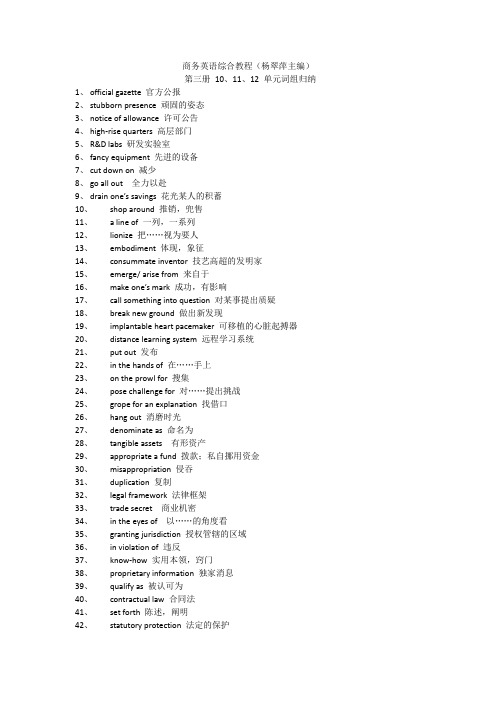
商务英语综合教程(杨翠萍主编)第三册10、11、12 单元词组归纳1、official gazette 官方公报2、stubborn presence 顽固的姿态3、notice of allowance 许可公告4、high-rise quarters 高层部门5、R&D labs 研发实验室6、fancy equipment 先进的设备7、cut down on 减少8、go all out 全力以赴9、drain one’s savings 花光某人的积蓄10、shop around 推销,兜售11、 a line of 一列,一系列12、lionize 把……视为要人13、embodiment 体现,象征14、consummate inventor 技艺高超的发明家15、emerge/ arise from 来自于16、make one’s mark 成功,有影响17、call something into question 对某事提出质疑18、break new ground 做出新发现19、implantable heart pacemaker 可移植的心脏起搏器20、distance learning system 远程学习系统21、put out 发布22、in the hands of 在……手上23、on the prowl for 搜集24、pose challenge for 对……提出挑战25、grope for an explanation 找借口26、hang out 消磨时光27、denominate as 命名为28、tangible assets 有形资产29、appropriate a fund 拨款;私自挪用资金30、misappropriation 侵吞31、duplication 复制32、legal framework 法律框架33、trade secret商业机密34、in the eyes of 以……的角度看35、granting jurisdiction 授权管辖的区域36、in violation of 违反37、know-how 实用本领,窍门38、proprietary information 独家消息39、qualify as 被认可为40、contractual law 合同法41、set forth 陈述,阐明42、statutory protection 法定的保护43、laws of nature 自然法44、be predicated on 基于,取决于45、in light of 鉴于46、take precautions to 采取预防措施47、as the case may be 根据具体情况而定48、precondition,premise 前提(条件)49、under the gun 在压力或攻击下50、nose around 搜索,探问51、immune to 对……免疫,免于……52、price/ earning ratio 市盈率53、tap into 发掘,探索54、breezy chatter 轻松活泼的交谈55、under one’s belt 经历过56、prospective buyer 可能的购买者57、promotional spot 促销点58、treasure trove 有价值的发现或收藏物59、be fired up 充满热情60、 a pile of 一堆,一叠61、printout, handbill, leaflet, fly sheet 传单62、be steeped in 专心于63、pump into 投资于64、at the helm of 掌舵65、compare notes 交流意见和经验66、self-monitoring system 自我监督机制67、swap message 交流信息68、populist ethos 平民主义精神69、trading platform 交易平台70、mail order catalogs 邮购目录71、distribution costs 分销费用72、build an ongoing relationship with customers 与顾客建立持久的关系73、credit card transaction 信用卡交易74、randomly browse electronic catalogs 随机浏览电子目录75、schedule airline flights 安排航班76、travel literature 旅行指南77、subcontractor 分包商78、on hand 现有79、excess inventories 过量的库存80、labor- intensive 劳动力密集的81、whereabouts 行踪82、in one’s infancy 在事物的初始阶段83、tax-free zone 免税区84、lobby 游说85、browser window 浏览器窗口86、divulge credit card information 泄露信用卡信息87、put somebody at ease 使某人安心88、junk mail/ spam 垃圾邮件89、storefront display 店面陈列,展示90、hurtle toward 向某方向飞快移动91、marketing canon 市场标准92、in the hope of 希望93、scratch the surface of 触及……的表面94、mind-stretching 绞尽脑汁的95、leave somebody/ something behind 超过96、zero-defect 零缺陷97、differentiator 区分者98、leverage something to the fullest 充分利用99、in a win-win situation 双赢局面100、come of age 成年101、stick to the principles 坚持原则102、deep-pocketed companies 财力雄厚的公司103、customer loyalty 顾客忠诚度104、latent, unexpressed, unarticulated needs 未言明的需求105、overseas market 海外市场106、prosumer 参与自己所购产品设计的顾客107、driving agent 激励因素108、customer- centric 以顾客为中心的109、customer empowerment 顾客授权110、tap into 深入了解111、be akin to 和……类似112、 a performance-enhancement food 提升表现的食品113、the board of trustees 董事会114、give way to 给……让路115、lose out 在竞争中失败;遭受损失116、attention economy 注意力经济117、monetary incentives 金钱激励118、beg the question of 回避问题的实质119、delude oneself into 欺骗某人120、eyeball to eyeball 面对面地;争锋相对地121、wrap up something 结束某事122、lean- and- mean companies 精简高效的公司123、lose sight of 忽略,忘记。
unit 2
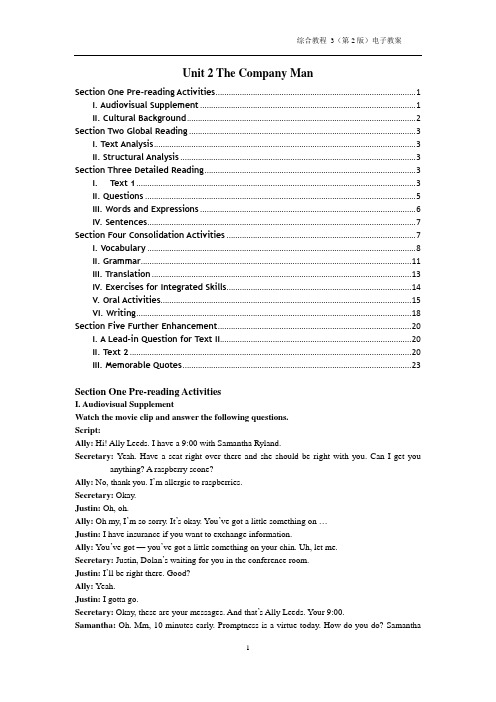
Unit 2 The Company ManSection One Pre-reading Activities (1)I. Audiovisual Supplement (1)II. Cultural Background (2)Section Two Global Reading (3)I. Text Analysis (3)II. Structural Analysis (3)Section Three Detailed Reading (3)I.Text 1 (3)II. Questions (5)III. Words and Expressions (6)IV. Sentences (7)Section Four Consolidation Activities (7)I. Vocabulary (8)II. Grammar (11)III. Translation (13)IV. Exercises for Integrated Skills (14)V. Oral Activities (15)VI. Writing (18)Section Five Further Enhancement (20)I. A Lead-in Question for Text II (20)II. Text 2 (20)III. Memorable Quotes (23)Section One Pre-reading ActivitiesI. Audiovisual SupplementWatch the movie clip and answer the following questions.Script:Ally: Hi! Ally Leeds. I have a 9:00 with Samantha Ryland.Secretary: Yeah. Have a seat right over there and she should be right with you. Can I get you anything? A raspberry scone?Ally: No, thank you. I‘m allergic to raspberries.Secretary: Okay.Justin: Oh, oh.Ally: Oh my, I‘m so sorry. It‘s okay. You‘ve got a little something on …Justin: I have insurance if you want to exchange information.Ally: You‘ve got — you‘ve got a little something on your chin. Uh, let me.Secretary: Justin, Dolan‘s waiting for you in the conference room.Justin: I‘ll be right there. Good?Ally: Yeah.Justin: I gotta go.Secretary: Okay, these are your messages. And that‘s Ally Leeds. Your 9:00.Samantha: Oh. Mm, 10 minutes early. Promptness is a virtue today. How do you do? SamanthaRyland.Ally: Ally Leeds.Samantha: Perfect. Follow me. Hold my calls … unless it‘s Donner. I just wanted to say what an incredible honour it is to finally meet you. I mean, what you did with the FioraPerfume line was genius.Ally: Yeah, it smelled like wet dog. Well, Edwin land used to say that marketing is what you do when your product‘s no good.Samantha: Mmm, you did your homework. Have a seat.Ally: Is that the original Pumpkin Patch Doll?Samantha: Sure is. Put the Ryland Agency on the map. But that was a long time ago. When men were men and ads were ads. Let‘s talk —what‘s your name?Ally: Ally.Samantha: Ally Leeds.Ally: Let me give you a copy of my resume.Samantha: Ah, keep it. References are much more important in this line of work. Tony vouched for you. That‘s all I care about. So how do you feel about personal fitness?Ally: I jog three miles a day.Samantha: And Shakespeare?Ally: Well, actually I played the Courtezan in a college production of ―A Comedy of Errors.‖ I believe in incorporating a little dramatic flair —Samantha: What about homework?Ally: I‘m a big believer of always being prepared.Samantha: Terrific. Can you be available at a moment‘s notice?Ally: I‘m very dedicated.Samantha: Also I‘m looking for a disciplinarian.Ally: I ran my division for two weeks when Johnson went on vacation.Samantha: Hmm. Good. I believe in being honest so I‘m gonna be straight with you. My husband has been back East for the last two months opening our New York office. MeanwhileI am here desperately trying to balance — being a mother, being a father, and runningan entire advertising agency. I have come to the inevitable conclusion that I need help.Excuse me.Questions:1.Why does Samantha refuse to read Ally‘s resume?Because she says, ―References are much more important in this line of work. Tony vouched for you. That‘s all I care about.‖2.Why does Samantha need help?Her husband has been back East for the last two months opening their New York office.Meanwhile she is here desperately trying to balance — being a mother, being a father, and running an entire advertising agency. So she has come to the inevitable conclusion that she needs help.II. Cultural Background1. A recent global survey by the Centre for Work-Life Policy, a New York-based nonprofitgroup, found that 45% of executives were ―extreme‖ workers, putting in more than 60 hoursa week. Some 65% of men said their work stopped them from having a strong relationshipwith their children. The same was true for 33% of women.2.Workaholism has not been extensively researched and does not have a clear, clinicaldefinition, but it can be a serious problem.3. A person who is addicted to work may experience depression, anxiety, anger, high bloodpressure, and a weakened immune system as a result of the high stress.4.Spouses and children can also be affected, with workaholics having a higher divorce rate thanothers.Section Two Global ReadingI. Text AnalysisMain Idea●In a colloquial style, the author paints an ironic picture of the life of a company man and hisfamily.●The man was a workaholic who died of a heart attack, which surprised no one. He devoted allhis thoughts and energy to work and everything else was secondary to that and the end might be considered tragically heroic: he worked himself to death.II. Structural AnalysisParagraph 1 —The introductory part.Paragraphs 2-6 —This part reports how devoted the man was to his work.Paragraphs 7-13 —This part describes Phil‘s role in his family.Paragraphs 14-16 —This is the end of the essay. After the cause of Phil‘s death being restated, the author goes on to report the company president‘s inquiry for his successor.Section Three Detailed ReadingI.Text 1The Company ManEllen Goodman11 He worked himself to death, finally and precisely, at 3:00 a.m. Sunday morning.2 The obituary didn‘t say that, of course. It said that he died of a coronary thrombosis— I think that was it — but everyone among his friends and acquaintances knew it instantly. He was a perfect Type A2, a workaholic, a classic, they said to each other and shook their heads —and thought for five or ten minutes about the way they lived.3 This man who worked himself to death finally and precisely at 3:00 a.m. Sunday morning — on his day off — was fifty-one years old and a vice-president. He was, however, one of six vice-presidents, and one of three who might conceivably — if the president died or retired soon enough — have moved to the top spot. Phil knew that.4 He worked six days a week, five of them until eight or nine at night, during a time when his own company had begun the four-day week for everyone but the executives. He worked like the Important People3. He had no outside ―extracurricular interests,‖ unless, of course, you think about a monthly golf game that way. To Phil, it was work. He always ate egg salad sandwiches at his desk. He was, of course, overweight, by 20 or 25 pounds. He thought it was okay, though, because he didn‘t smoke.5 On Saturdays, Phil wore a sports jacket to the office instead of a suit, because it was the weekend.6 He had a lot of people working for him, maybe sixty, and most of them liked him most of th e time. Three of them will be seriously considered for his job. The obituary didn‘t mention that.7 But it did list his ―survivors‖ quite accurately. He is survived by his wife, Helen, forty-eight years old, a good woman of no particular marketable skills, who worked in an office before marrying and mothering. She had, according to her daughter, given up trying to compete with his work years ago, when the children were small. A company friend said, ―I know how much you will miss him.‖ And she answered,―I already have.‖8 ―Missing him all these years,‖ she must have given up part of herself which had cared too much for the man. She would be ―well taken care of.‖9 His ―dearly beloved‖ eldest of the ―dearly beloved‖ children is a hard-working executive ina manufacturing firm down South. In the day and a half before the funeral, he went around the neighborhood researching his father, asking the neighbors what he was like. They were embarrassed.10 His second child is a girl, who is twenty-four and newly married. She lives near her mother and they are close, but whenever she was alone with her father, in a car driving somewhere, they had nothing to say to each other.11 The youngest is twenty, a boy, a high-school graduate who has spent the last couple of years, like a lot of his friends, doing enough odd jobs to stay in grass and food4. He was the one who tried to grab at his father, and tried to mean enough to him to keep the man at home. He was his father‘s favorite. Over the last two y ears, Phil stayed up nights worrying about the boy.12 The boy once said, ―My father and I only board here5.‖13 At the funeral, the sixty-year-old company president told the forty-eight-year-old widow that the fifty-one-year-old deceased had meant much to the company and would be missed and would be hard to replace. The widow didn‘t look him in the eye. She was afraid he would read her bitterness and, after all, she would need him to straighten out the finances — the stock options6 and all that.14 Phil was overweight and nervous and worked too hard. If he wasn‘t at the office he was worried about it. Phil was a Type A, a heart-attack natural. You could have picked him out in a minute from a lineup.15 So when he finally worked himself to death, at precisely 3:00 a.m. Sunday morning, no one was really surprised.16 By 5:00 p.m. the afternoon of the funeral, the company president had begun, discreetly of course, with care and taste, to make inquiries about his replacement. One of three men. He asked around: ―Who‘s been working the hardest?‖II. Questions1)What is the general tone of this article? What is the author‘s attitude toward Phil?The general tone of this article is sarcastic. In describing in a mockingly serious manner different people‘s responses to Phil‘s death, the author wants to make the readers see the absurdity of a society that produces such a tragic figure as Phil. He is, in the deep sense, sympathetic with Phil, whose ignorance of the cause of his own tragedy renders him more tragic.2)Why does the author frequently mention the time ―3.00 a.m. Sunday morning‖?The time is revealing, from which readers can be easily attracted to give a deep thinking about the cause of Phil‘s tragedy for 3.00 a.m. is within the small hours which might indicate that Phil had frequently worked well into the night when alive.3)Why does the author mention the company president‘s inquiries about Phil‘s replacement atthe end of the article?From this detail we can get the idea that the company, as well as other parts of the society, operates like a lifeless and ruthless machine and all people working in it have been dehumanized and transformed into parts of this machine. Therefore, we can draw the lesson that Phil‘s tragedy is not merely a tragedy of himself, but rather of all the people who are not aware of their miserable existence or do not have the insight and power to change matters.Class ActivityGroup discussion: Why isn’t the name of the deceased mentioned at the very beginning? Unlike most essays which usually make it clear who the character is at the very beginning, this essay begins with the pronoun “He.”At the end of the third paragraph where the name was finally mentioned, readers only get to know the first name of the deceased, not his full name.This, on the one hand, is meant to get the readers involved in finding out who is being discussed, and on the other, suggests the fact that workaholicism has become a common phenomenon. The deceased was only one of the many workaholics who bury themselves in their work and forget all about their individuality.III. Words and ExpressionsParagraph 1to deathused after an adjective or a verb to emphasize the action, state, or feeling mentionede.g. worried to death; frightened to death; bored to death; starve to death; put to deathParagraphs 2-6obituary (infml obit) n. printed notice (e.g. in a newspaper) of a person‘s death, often with a short account of his life and achievementscoronary thrombosis obstruction of a coronary artery by a thrombus, often leading to destruction of heart muscle (心脏的)冠状动脉血栓症overweight adj. (of people) too heavy and fatCollocations:a bit / a little / slightly overweighte.g. He was tall and slightly overweight.He‘s a bit overweight, not too much.seriously/heavily overweight (=very overweight)e.g. Being seriously overweight doubles the risk of heart disease.grossly overweight (=extremely overweight)e.g. The vet said the dog was grossly overweight and that it was affecting his heart.be 5 kilos/20 pounds, etc. overweighte.g. I‘m about 15 pounds overweight right now.Comparison:fat: having too much flesh on your body. It is rude to tell someone directly that they are fat.e.g. She thinks she‘s fat.He looks the same, just a little fatter.overweight: weighing more than you should. Many diseases are caused by being overweight.e.g. She was several kilos overweight.large: used when saying that someone is tall and often fat. ―Large‖is more common than ―big‖ in written English.e.g. My father was a large man.two large ladiesobese: extremely fat in a way that is unhealthye.g.: He went to a summer camp for obese teenagers.chubby: slightly fat in a nice-looking way (used especially about babies and children)e.g. A chubby little baby was playing on the rug.plump: a woman or child who is plump is slightly fat, especially in a pleasant waye.g. Her mother was a plump cheerful woman.flabby: having soft loose flesh rather than strong musclese.g. a flabby stomachHer body was getting old and flabby.portly: (literary) fat and round —used especially about an old mane.g. The bishop was a portly middle-aged gentleman.Paragraph 7-13survive v. live longer than sb. else, usually sb. closely related to youPractice那老太太的子女都先她而去世了。
- 1、下载文档前请自行甄别文档内容的完整性,平台不提供额外的编辑、内容补充、找答案等附加服务。
- 2、"仅部分预览"的文档,不可在线预览部分如存在完整性等问题,可反馈申请退款(可完整预览的文档不适用该条件!)。
- 3、如文档侵犯您的权益,请联系客服反馈,我们会尽快为您处理(人工客服工作时间:9:00-18:30)。
2. What do you think are the criteria of a successful entrepreneur? • Total capital of his business • High rate of profit margin • Sales value • Technological advancement level • Corporate culture • Realization of social responsibility • Number of branches in overseas market • Market share • To be a listed company
1. What is an entrepreneur? • a person who sets up a business or businesses, taking on greater than normal financial risks in order to do so企业家,企业创办人 • ■a promoter in the entertainment industry • (娱乐业的)承办人,主办者
Paragraph 13-15
• What does the writer mean by having confidence in his venture? • Cite Chinese food industry for example to show that this point is not a belief of the entrepreneurs (三鹿、湖南茶油,圣元,冠生 园,奥康皮鞋) • Is it a problem of corporate integrity/ or simply a problem of quality?
商务英语综合教程III—— Unit 2
Lecturer: Lixia
Warm-up questions: • How do you define business success? • What can be known as a successful entrepreneur? • What qualities one must have to become a success? • What are the major disadvantages that a Chinese enterprise has to overcome in the face of tense international competition? • Does GDP rise means all for economic development? • Look at p. 35 and do question 5 in a group.
Paragraph 7
• • • • What is the structural function of this paragraph? Why does it stand alone? Explain the phrase entrepreneur’s profile? Can you pick up some typical words used which reveals the writer’s language style? • What are the major qualities that one needs to be a good entrepreneur?
Reading I
ParagraLeabharlann h 1:• What is the function of Para. 1? • What does the word spin in “spin a passionate tale” imply? • What figure of speech is used in “the entrepreneurial muse”? • Does an entrepreneur sometimes succeed with the help of inspiration?
Paragraphs 16-18
• What sacrifices does an entrepreneur usually make? • Do you think it’s possible to strike a good balance between business success and personal /family life? • How do you explain the fact that many successful women entrepreneurs failed their marriage and family life like tense relation with their children?
Paragraphs 22
• Use some example to show leading by example is an important and indispensable quality? (mine disasters) • On what occasions do entrepreneurs particular need to lead by example?
Reading II
Para. 1 1. What is the unquestionable reality stated by the author? 2. What is the function of the first Paragraph?
Answers: • Business are vulnerable to risks and may fail with as short a term as 6-12 months. • Put forward the prerequisite for his strategy--“make money by thinking the unthinkable”
Homework: 1. 1. How do you look at Chenguangbiao who promised to donate all of his property after his death (naked donation)and zhourenfa who is decided to donate 99% of his wealth? 2. What do you think of the fact that some Chinese tycoons refused to attend the meeting sponsored/initiated by Bill Gates and Warren Buffett? 3. Do you think it’s only up to the rich and wealthy people who should be devoted to Charity? Why or Why not? 4. How meaningful is it for the whole China to promote the cause of charity? What is the role of the government? 5. Is Chinse Housing Industry sustainable in its development? Why/Why not?
Paragraphs 8-12
• How does the narrator makes his stand persuasive? • Why must an entrepreneur have self-confidence? • What kind of people will be affected by an entrepreneur’s self-confidence? • numerate the important P.R.s of a business? • What does the narrator recommend so as to build-up one’s self-confidence? • What is a balance sheet? What is a personal balance sheet? • How do you deal with your procrastination if you have it? • Make a list of synonyms of both weakness and strengths • What is important in building up self-confidence
• • • • • • • • • • • • • • •
Have good capital support Ability to delegate tasks Ambition Perseverance Flexibility Politically and economically sensitive Decisiveness Persistence Upright/highly integral Strong will Resourceful Risk-taking Responsible Good network of social connections Good at PR
Paragraphs 19-21
• Do you think it is meaningful to have the wife of a store president as their first customer of a new product? why? • Name some of the cream types? • What are the usual steps of developing and launching a new product? • What is the Chinese for “crash course”?
